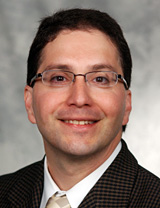Feature Story
Health Center Today, April 9, 2010
Collaboration Studying Heart Disease Risk in Breast Cancer Survivors
By Chris DeFrancesco
Cardiologists, oncologists and radiologists will work together to research the effects of chemotherapy on breast cancer survivors’ heart health.
The Connecticut Breast Health Initiative has awarded a $50,000 grant to Dr. Erick Avelar, director of noninvasive cardiac imaging in the Calhoun Cardiology Center, to lead this effort.
"Some breast cancer patients who receive chemotherapy are susceptible to developing heart muscle disease called cardiomyopathy, anytime from right after treatment to long after it’s discontinued," Avelar says. "There are no current available imaging tests or biomarkers that can detect early cardiac changes associated with chemotherapy. This is an exciting collaboration with the Neag Comprehensive Cancer Center."
Dr. Susan Tannenbaum, medical director of the Center’s Clinical and Translational Breast Program, says women are very concerned about what chemotherapy might do to their heart.
"This study will address those concerns," Tannenbaum says. "Women who are to receive potentially heart-damaging chemotherapy will be asked to participate in this research. If we, the oncologists, determine they’re able to and will benefit from such chemotherapy, they will also be offered the study. They will participate through heart imaging and a cardiologist’s review of this imaging with direct feedback if there are any health concerns identified. Additionally, novel blood tests will be drawn to add to our knowledge of early heart injury."
Imaging specialists from both Radiology and Cardiology will interpret the advanced cardiac images.
"This study combines some unique strength here that includes testing a potential new biomarker for cancer treatment-related cardiotoxicity," says Dr. Bruce Liang, director of the Calhoun Cardiology Center. "Early diagnosis via a blood test would be simple and may offer a chance to begin early treatment for cancer drug-related heart failure."
Dr. Carolyn Runowicz, director of the Neag Comprehensive Cancer Center, says it could impact thousands of breast cancer survivors.
"This project is true ‘translational’ team science involving physician-scientists and clinicians from three different medical disciplines – taking knowledge gained in the lab and translating it into improved treatments," Runowicz says. "In this case we are looking for biomarkers that will identify patients at risk for cardiac disease following chemotherapy."
The researchers will study the effectiveness of cardiac magnetic resonance imaging (MRI) in diagnosing myocardial edema, an unsafe fluid buildup on the middle muscular layer of the heart’s wall, as an early sign of cardiotoxicity.
"Currently we look for elevated levels of a muscle protein called troponin to help detect heart injury," Avelar says. "But we’re seeing evidence now that suggests cardiac MRI may be able to detect heart injury, even before troponin levels become elevated."
Health Center researchers also will investigate the potential of a biomarker they already are studying called serum caspases, which they say is an indicator of cell death. This research is unique to the Liang lab.
"It is an example of bedside-to-bench translational research that combines expertise from the clinic to basic laboratory and their impacts on different diseases," Liang says.
"The thought is, between the biomarkers and our cardiac imaging capability, we can better determine the risk of early cardiac dysfunction and ultimately improve patient management strategies," Avelar says. "This multidisciplinary approach could lead to the establishment of a cardio-oncology program at the UConn Health Center."
Connecticut Breast Health Initiative President Joyce Bray says the study will impact a large number of women with breast cancer who are treated with chemotherapy and face the risk of developing significant cardiac complications.
"Collaboration by the Departments of Oncology, Cardiology and Radiology made this grant very exciting to fund," Bray says.



